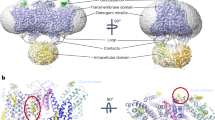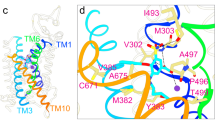Abstract
OUABAIN has been shown to inhibit electrolyte transport in a number of tissues, including erythrocytes1,2, brain and kidney3,4. Ouabain also inhibits that adenosine triphosphatase obtained from membrane and sub-cellular preparations which is stimulated by sodium plus potassium ions5–7. Recent work has shown that this enzyme must play an important part in the mechanism of active ion transport7–10.
This is a preview of subscription content, access via your institution
Access options
Subscribe to this journal
Receive 51 print issues and online access
$199.00 per year
only $3.90 per issue
Buy this article
- Purchase on Springer Link
- Instant access to full article PDF
Prices may be subject to local taxes which are calculated during checkout
Similar content being viewed by others
References
Schatzmann, H. J., Helv. physiol. Acta, 11, 346 (1953).
Kahn, J. B., and Acheson, G. H., J. Pharmacol., 115, 305 (1955).
Yoshida, H., Nakada, T., and Fujisawa, H., Biochim. Biophys. Acta, 48, 614 (1961).
Whittam, R., and Wheeler, K. P., Biochim. Biophys. Acta, 51, 622 (1961).
Dunham, E. T., and Glynn, I. M., J. Physiol., 156, 274 (1961).
Post, R. L., Merritt, C. R., Kinsolving, C. R., and Albright, C. D., J. Biol. Chem., 235, 1796 (1960).
Wheeler, K. P., and Whittam, R., Biochem. J., 85, 495 (1962).
Skou, J. C., Biochim. Biophys. Acta, 58, 314 (1962).
Aldridge, W. N., Biochem. J., 83, 527 (1962).
Bonting, S. L., Caravaggio, L. L., and Hawkins, N. M., Arch. Biochem. Biophys., 98, 413 (1962).
Charnock, J. S., and Post, R. L., Austral. J. Exp. Biol. and Med. Sci. (in the press).
Schwartz, A., Bachelard, H. S., and McIlwain, H., Biochem. J., 84, 626 (1962).
Charnock, J. S., Rosenthal, A. L., and Post, R. L., Fed. Proc., 22, 212 (1963).
Whittam, R., Biochem. J., 84, 110 (1962).
Post, R. L., and Albright, C. D., Symp. Membrane Transport and Metabolism, Prague, 1961, edit. by Kleinzeller, A., and Kotyk, A., 219 (Publishing House, Czechoslovak Acad. Sci.).
Järnefelt, J., Biochem. Biophys. Res. Comm., 6, 285 (1961).
Hokin, L. E., and Hokin, M. R., J. Gen. Physiol., 44, 61 (1960).
Kanfer, J., and Titmus, E., Biochim. Biophys. Acta, 54, 601 (1961).
Heard, P. J., Nature, 193, 451 (1962).
Judah, J. D., and Ahmed, K., Biochim. Biophys. Acta, 71, 34 (1963).
Author information
Authors and Affiliations
Rights and permissions
About this article
Cite this article
CHARNOCK, J., POST, R. Evidence of the Mechanism of Ouabain Inhibition of Cation Activated Adenosine Triphosphatase. Nature 199, 910–911 (1963). https://doi.org/10.1038/199910a0
Issue Date:
DOI: https://doi.org/10.1038/199910a0
This article is cited by
-
FXYD2, a γ subunit of Na+,K+-ATPase, maintains persistent mechanical allodynia induced by inflammation
Cell Research (2015)
-
Biochemical correlates of dissolved mercury uptake by the oyster Ostrea edulis
Marine Biology (1978)
-
Harmaline: A competitive inhibitor of Na Ion in the (Na++K+)-ATPase system
The Journal of Membrane Biology (1973)
-
A study of sodium release in the course of ATP hydrolysis by membrane ATPase
The Journal of Membrane Biology (1970)
-
The enzymatic basis for the active transport of sodium and potassium
Protoplasma (1967)
Comments
By submitting a comment you agree to abide by our Terms and Community Guidelines. If you find something abusive or that does not comply with our terms or guidelines please flag it as inappropriate.



